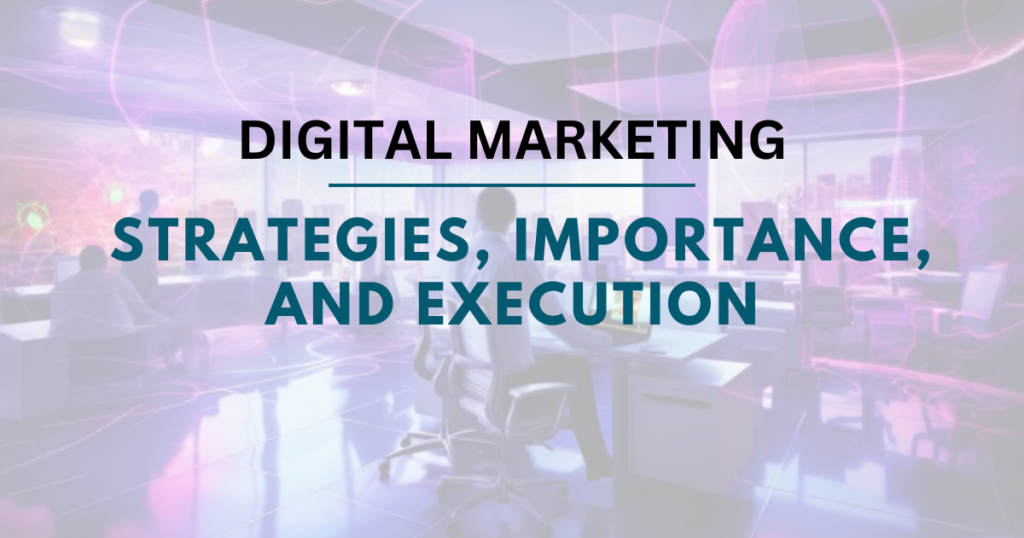Search Engine Optimization (SEO) is the cornerstone of digital marketing, a critical component that can make or break your online presence. Understanding SEO’s intricacies is essential for anyone looking to succeed in the digital landscape.
What is SEO?
SEO stands for Search Engine Optimization, a practice aimed at improving the visibility and ranking of a website or web page in search engine results pages (SERPs). By optimizing various elements of a website, businesses and individuals can attract more organic (non-paid) traffic, ultimately driving growth and achieving marketing objectives.
Importance of SEO in Digital Marketing
In the vast ocean of digital content, SEO acts as a beacon, guiding users to relevant, high-quality information. Effective SEO can enhance brand visibility, increase web traffic, and improve user engagement. Moreover, SEO is a cost-effective strategy, offering a high return on investment (ROI) compared to paid advertising. By mastering SEO, businesses can establish a strong online presence, outshine competitors, and connect with their target audience more effectively.
History and Evolution of SEO
SEO has come a long way since its inception. Understanding its history helps us appreciate the complexities and advancements in this ever-evolving field.
- Early Days of SEO : The early days of SEO were characterized by simple tactics like keyword stuffing and meta tag manipulation. As search engines like Google emerged, the need for more sophisticated algorithms became apparent. The focus shifted from merely matching keywords to understanding user intent and delivering relevant content.
- Major Algorithm Updates : Over the years, search engines have rolled out numerous algorithm updates to improve search quality. Notable updates include Google’s Panda, Penguin, and Hummingbird, each targeting specific aspects like content quality, backlink integrity, and semantic search. These updates have significantly impacted SEO strategies, emphasizing the need for quality content and ethical practices.
- Evolution Over the Years : The evolution of SEO reflects the changing digital landscape. From the rise of mobile search to the advent of voice search and artificial intelligence (AI), SEO continues to adapt to new technologies and user behaviors. Staying updated with these changes is crucial for maintaining a competitive edge in SEO.
Understanding Search Engines
To excel in SEO, one must first understand how search engines work. This involves learning about their core functions: crawling, indexing, and ranking.
- How Search Engines Work : Search engines like Google use complex algorithms to scour the web, indexing content, and ranking it based on relevance and quality. They analyze hundreds of factors, including keywords, backlinks, and user experience, to deliver the most relevant results to users.
- Crawling and Indexing : Crawling is the process by which search engines discover new content. They use bots, known as spiders, to crawl websites and follow links. Once a page is crawled, it is indexed – that is, stored in a massive database. Properly structured websites with clear navigation and quality content are more likely to be effectively crawled and indexed.
- Importance of SERP : The Search Engine Results Page (SERP) is where users find answers to their queries. Ranking high on the SERP is crucial for visibility and traffic. Features like featured snippets, knowledge graphs, and local packs can enhance a site’s presence on the SERP, driving more organic clicks.
On-Page SEO
On-Page SEO involves optimizing individual web pages to rank higher and earn more relevant traffic. It includes various elements such as keyword research, meta tags, content quality, and URL structure.
- Keyword Research : Keyword research is the foundation of on-page SEO. Identifying the right keywords involves understanding user intent and analyzing search volume and competition. Tools like Google Keyword Planner and SEMrush can aid in discovering valuable keywords that align with your content strategy.
- Meta Tags Optimization : Meta tags, including the title tag and meta description, play a significant role in on-page SEO. They provide search engines and users with information about the content of a page. Crafting compelling and keyword-rich meta tags can enhance click-through rates and improve rankings.
- Content Quality and Relevance : High-quality, relevant content is the cornerstone of effective on-page SEO. Content should be informative, engaging, and tailored to the needs of the target audience. Incorporating keywords naturally, using clear headings, and providing valuable information can boost a page’s SEO performance.
- URL Structure: A clean and descriptive URL structure is essential for both search engines and users. URLs should be short, include relevant keywords, and accurately reflect the content of the page. Well-structured URLs can improve click-through rates and enhance the overall user experience.
Off-Page SEO
Off-Page SEO refers to activities outside your website that influence your rankings. It includes strategies like backlink building, social media signals, and influencer marketing.
- Backlink Building : Backlinks, or inbound links, are links from other websites to your site. They are a crucial ranking factor, as they indicate to search engines that your content is valuable and trustworthy. Building high-quality backlinks involves creating shareable content, guest posting, and forming partnerships with reputable websites.
- Social Media Signals: Social media activity can indirectly impact SEO. While social media links don’t carry the same weight as traditional backlinks, they can drive traffic, increase brand awareness, and encourage content sharing. Engaging with your audience on social platforms can enhance your online presence and contribute to your SEO efforts.
- Influencer Marketing : Collaborating with influencers can amplify your reach and attract high-quality backlinks. Influencers can help promote your content to a broader audience, driving traffic and boosting your SEO. Building relationships with industry influencers can enhance your credibility and visibility in the digital space.
Technical SEO
Technical SEO focuses on optimizing the technical aspects of your website to improve its performance and visibility. This includes website speed, mobile-friendliness, and security.
- Website Speed Optimization : Page speed is a critical factor in both user experience and SEO. Slow-loading pages can lead to higher bounce rates and lower rankings. Techniques such as optimizing images, leveraging browser caching, and minimizing JavaScript can enhance page speed and improve SEO performance.
- Mobile-Friendly Design: With the increasing use of mobile devices, having a mobile-friendly website is essential. Responsive design ensures that your site provides a seamless experience across all devices, which is crucial for both user satisfaction and search engine rankings.
- Secure Sockets Layer (SSL): Security is a top priority for search engines and users alike. Implementing SSL certificates encrypts data between the user and the server, ensuring a secure connection. Websites with SSL certificates are favored by search engines and can rank higher in the SERP.
Local SEO
Local SEO focuses on optimizing your online presence for local search queries. It is crucial for businesses that operate in specific geographic areas.
- Importance of Local SEO: Local SEO helps businesses attract customers from their local area. Optimizing for local search can increase foot traffic, drive more local leads, and enhance your overall online visibility.
- Google My Business Optimization: Creating and optimizing a Google My Business (GMB) profile is a key component of local SEO. Ensure your GMB listing is complete, accurate, and regularly updated. Encourage customer reviews and respond to them to build trust and improve your local rankings.
- Local Citations and Directories: Consistency in your business name, address, and phone number (NAP) across local citations and directories is vital for local SEO. Ensure your business information is accurate and consistent across all platforms to improve your local search visibility.
SEO Tools and Software
Numerous tools and software are available to aid in your SEO efforts. These tools can help with keyword research, analytics, and rank tracking.
- Keyword Research Tools : Tools like Google Keyword Planner, Ahrefs, and SEMrush can help identify valuable keywords for your content. These tools provide insights into search volume, competition, and related keywords, aiding in the development of an effective keyword strategy.
- SEO Analytics Tools : Analyzing your SEO performance is crucial for understanding what’s working and what needs improvement. Tools like Google Analytics and Moz can provide detailed insights into your website’s traffic, user behavior, and SEO performance.
- Rank Tracking Tools: Keeping track of your keyword rankings is essential for measuring the success of your SEO efforts. Rank tracking tools like SERPWatcher and Rank Tracker can monitor your rankings over time, helping you adjust your strategy as needed.
Content Marketing and SEO
Content marketing and SEO go hand in hand. Creating valuable, high-quality content can enhance your SEO efforts and drive more traffic to your site.
- Content Creation Strategies : Developing a content marketing strategy involves identifying your target audience, understanding their needs, and creating content that addresses those needs. Regularly publishing high-quality, relevant content can boost your SEO and establish your authority in your niche.
- Blogging: Blogging is an effective way to create fresh content and target specific keywords. Regular blog posts can attract more visitors, generate backlinks, and improve your site’s overall SEO.
- Video and Visual Content : Incorporating video and visual content into your strategy can enhance user engagement and SEO. Videos, infographics, and images can make your content more appealing and shareable, driving more traffic and improving your SEO performance.
Link Building Strategies
Effective link-building strategies are essential for improving your site’s authority and rankings. Quality backlinks from reputable sites can significantly boost your SEO.
- Importance of Quality Backlinks : Not all backlinks are created equal. High-quality backlinks from authoritative websites carry more weight and can positively impact your SEO. Focus on building relationships with reputable sites in your industry to acquire valuable backlinks.
- Guest Posting: Guest posting involves writing articles for other websites in your niche. This strategy can help you reach a broader audience, build your authority, and acquire high-quality backlinks.
- Broken Link Building: Broken link building involves finding broken links on other websites and offering your content as a replacement. This strategy can help you acquire valuable backlinks while providing a useful service to other site owners.
SEO for E-commerce
E-commerce sites have unique SEO needs. Optimizing product pages and improving user experience are crucial for driving traffic and increasing sales.
- Product Page Optimization : Optimizing product pages involves using relevant keywords, high-quality images, and detailed product descriptions. Ensure your pages are user-friendly and provide all the information needed to make a purchase decision.
- E-commerce SEO Best Practices: Best practices for e-commerce SEO include optimizing your site’s structure, improving page speed, and ensuring mobile-friendliness. Regularly updating your content and monitoring your site’s performance can also enhance your SEO.
- User Experience in E-commerce : User experience (UX) is critical for e-commerce success. A seamless, enjoyable shopping experience can reduce bounce rates, increase conversions, and improve your site’s SEO.
SEO Metrics and Analytics
Understanding and analyzing SEO metrics is essential for measuring the success of your efforts and making informed decisions.
- Important SEO Metrics: Key SEO metrics include organic traffic, bounce rate, conversion rate, and keyword rankings. Monitoring these metrics can provide insights into your site’s performance and highlight areas for improvement.
- Google Analytics : Google Analytics is a powerful tool for tracking and analyzing your site’s traffic and user behavior. It can help you understand how visitors interact with your site and identify opportunities for optimization.
- Measuring SEO Success: Measuring SEO success involves tracking key metrics, setting goals, and regularly reviewing your performance. By understanding what’s working and what needs improvement, you can refine your strategy and achieve better results.
SEO Trends and Future Predictions
Staying ahead of SEO trends is crucial for maintaining a competitive edge. Emerging technologies and changing user behaviors continually shape the future of SEO.
- Voice Search Optimization: Voice search optimization is becoming increasingly popular, with more users turning to virtual assistants for information. Optimizing for voice search involves using natural language, answering questions directly, and targeting long-tail keywords.
- AI and Machine Learning: AI and machine learning are transforming SEO. Search engines are becoming more sophisticated, understanding user intent better and delivering more accurate results. Incorporating AI into your SEO strategy can help you stay ahead of the competition.
- Future of SEO: The future of SEO will likely see continued advancements in technology, increased focus on user experience, and further integration with other digital marketing channels. Staying updated with these trends is essential for maintaining a strong online presence.
Common SEO Mistakes to Avoid
Avoiding common SEO mistakes can save you time and effort, ensuring your strategies are effective and sustainable.
- Keyword Stuffing: Keyword stuffing is the overuse of keywords in content, a practice penalized by search engines. Focus on creating natural, readable content that incorporates keywords seamlessly.
- Duplicate Content:Duplicate content can harm your SEO, as search engines may struggle to determine which version is most relevant. Ensure all your content is unique and valuable to avoid penalties.
- Ignoring Mobile Users: With the increasing use of mobile devices, ignoring mobile users can negatively impact your SEO. Ensure your site is mobile-friendly and provides a seamless experience across all devices.
SEO for Different Industries
Different industries have unique SEO needs. Tailoring your strategies to your specific industry can enhance your success.
- SEO for Small Businesses: Small businesses can benefit significantly from local SEO, targeted keywords, and high-quality content. Building a strong online presence can help small businesses compete with larger competitors.
- SEO for Large Enterprises: Large enterprises may require more complex SEO strategies, including international SEO, large-scale link building, and detailed analytics. Ensuring all aspects of the site are optimized can improve performance and rankings.
- SEO for Nonprofits : Nonprofits can use SEO to increase visibility, attract donations, and raise awareness for their causes. Focus on creating valuable content, optimizing for local search, and engaging with your audience.
The Role of User Experience in SEO
User experience (UX) is a critical component of SEO. A positive UX can improve engagement, reduce bounce rates, and enhance your site’s overall performance.
- Importance of UX: User experience is crucial for retaining visitors and encouraging them to engage with your content. A well-designed site with intuitive navigation, fast loading times, and valuable content can significantly impact your SEO.
- UX Best Practices for SEO: Best practices for UX include responsive design, clear navigation, and accessible content. Ensuring your site is user-friendly and provides a positive experience can improve your SEO and drive more traffic.
- Balancing UX and SEO: Balancing UX and SEO involves creating content and designs that appeal to both users and search engines. Focus on providing valuable information, optimizing technical aspects, and ensuring a seamless user experience.
SEO and Digital Marketing
SEO is a crucial component of digital marketing, working in tandem with other strategies to drive growth and success.
- SEO as a Part of Digital Marketing: SEO is an integral part of digital marketing, complementing other strategies like content marketing, social media, and paid advertising. An effective SEO strategy can enhance your overall marketing efforts and drive better results.
- Integrating SEO with Other Channels: Integrating SEO with other digital marketing channels involves aligning your strategies, sharing insights, and ensuring consistency. This holistic approach can amplify your efforts and maximize your impact.
Global SEO Strategies
Global SEO involves optimizing your site for international audiences, ensuring you reach and engage users worldwide.
- International SEO Best Practices: Best practices for international SEO include using hreflang tags, creating content tailored to different languages and cultures, and ensuring your site is accessible and relevant to global users.
- Multilingual SEO: Multilingual SEO involves optimizing your site for multiple languages. This can increase your reach, improve user experience, and drive more traffic from diverse regions.
- Geo-Targeting: Geo-targeting involves delivering content tailored to users’ geographic locations. This strategy can enhance user experience and improve your site’s relevance in different regions.
SEO and Social Media
Social media can influence SEO by driving traffic, increasing brand visibility, and encouraging content sharing.
- Impact of Social Media on SEO: While social media links don’t directly impact rankings, they can drive traffic and increase brand awareness. Engaging with your audience on social platforms can enhance your online presence and indirectly benefit your SEO.
- Social Media Optimization for SEO: Optimizing your social media profiles and content involves using relevant keywords, engaging with your audience, and sharing valuable content. This can increase your visibility and drive more traffic to your site.
Conclusion
SEO is a complex, ever-evolving field that plays a crucial role in digital marketing. By understanding its principles, staying updated with the latest trends, and implementing effective strategies, you can enhance your online presence and achieve your marketing goals. Whether you’re a beginner or an experienced professional, continuous learning and adaptation are key to SEO success. Embrace the journey, stay informed, and watch your online visibility soar.





A reliable SEO company for improving search engine rankings, your key to online success.
How to choose the best SEO company, tips from experts.
Why you should turn to SEO professionals, growth of your sales.
An article about the best SEO companies, customers’ experience.
Effectiveness of an SEO company for your website, main advantages.
seo company for shopify australia https://www.seorg-seo.com/ .
Wedding Bells Productions: creating wonders together, we strive.
marriage wedding video editing https://bestwedding-video.com/video-editing-services .
Thanks for fantastic information I was looking for this info for my mission.
casino play online https://24bet-casino.com .
Unlock the Secrets of New UK Online Casinos
mobile online gambling mobile online gambling .
Unique and personalized wedding experiences, trust us to make your day unforgettable.
wedding video editing company wedding video editing company .
Play Now!
All Australian Casino Sites with Huge Jackpots
australian online casino free bonus no deposit australian online casino free bonus no deposit .
Car rental for convenience and freedom of movement, unlimited possibilities.
9k yeti relaunch online slot http://www.casinowild24.com/all-games/slots/9-pots-of-gold.
How to rent a car in advance, the advantages and disadvantages of renting a car in advance, and how it will help you on your trip to avoid inconveniences on the spot to plan a carefree vacation .
free keno online no download free keno online no download .
радиаторы отопления стальные трубчатые вертикальные http://vertikalnyeradiatory.ru/.
primer-8
online roulette no deposit bonus online roulette no deposit bonus .
Срочная отправка товаров от Microsoft, для вашей удобности.
миграция между тенантами microsoft https://www.best-lip-filler.com .
Innovative technologies in the production of double glazed windows in Melbourne
republic windows & doors https://www.bestnosefiller.com .
Lineage 2 servers with competitive PvP
Lineage 2 Classic http://www.cryptoexlicense.com/chronicle/lineage-2-classic/ .
What are the benefits of having pets, why domestic animals have become so popular.
tips for choosing a pet, advantages of different pet breeds.how to ensure comfort and care for pets, how to create a pet’s diet.Interesting facts about pets, why pets are so amazing.effective methods of pet training, how to train a cat to walk on a leash.
domestic animals and pets https://www.petstorepetsupply.com/ .
New inventions that will make you question what’s possible, incredible inventions pushing the boundaries of science.
inventions by country https://washingtondchotelsonline.com/index.php/2024/06/09/trailblazing-inventions-leading-the-way/ .
Pingback: Why Bounce Rate Matters: Key Tactics for Improving Conversions -
Elite cars for your comfort
mercedes g63 hire http://trafficarbitration.com/cars/g63/ .
Efficient maintenance of heating and air conditioning systems, Create coziness and comfort in your home with our heating and air conditioning maintenance
ac installation company https://www.best-lip-filler.com /air-conditioning-services/air-conditioning-installation.html/ .
Practical tips for command coin collectors, to make your collection truly valuable.
custom firefighter coins https://command-coins.com/blogs/articles/custom-firefighter-challenge-coins/ .
Feel the difference with windows and doors from Republic Windows and Doors, for retaining warmth and comfort in your home.
windows that tilt inward https://www.finexmolicense.com/windows/upvc-tilt-turn-windows/ .
Interwood caskets: A symbol of respect
premium pet caskets for dogs http://www.best-interwood.com/ .
Upgrade your project with pine lumber, Looking for pine lumber? We’ve got you covered,biodegradable pet box distressed-paneling.com .
Play at the best online casinos: for incredible experiences
top casino no deposit bonus top casino no deposit bonus .
The best online casino, specially for you, emotions and thrill are guaranteed.
best live casino online https://casinowolfspins.com/casino-reviews/live-casinos .
https://www.adobe.com/